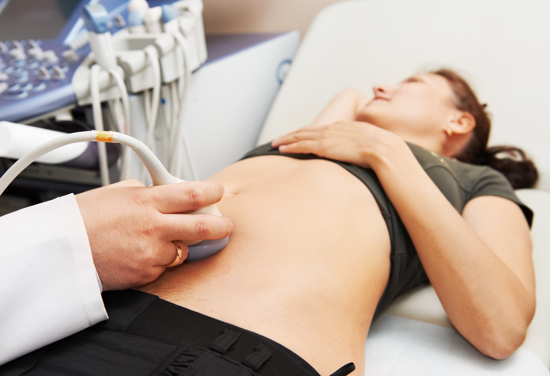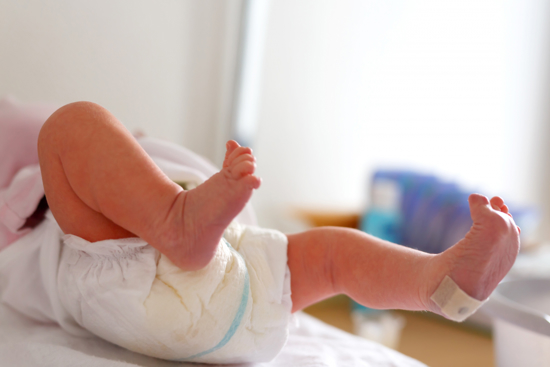If the parents are related, e.g. cousins, the risk of having children with a medical condition or congenital malformations is twice as high as when the parents are not related.
The risk is also higher if there have been many marriages between relatives within the family, so that the man and the woman are related in a number of ways. A close blood relationship between parents also increases the risk of stillbirth (death in the womb after the 20th week of pregnancy), infant death (death during the first year of life) and reduced life expectancy (death at any age up to adulthood).
Genetic abnormalities that cause disorders
There are many reasons why children can be born with medical conditions and congenital malformations. In some cases, the cause lies in the genes that we inherit from our mother and father. We all carry genetic abnormalities which can lead to disorders either in ourselves or in our children. Such abnormalities do not normally have any consequences, as we have two copies of each gene. If one gene does not work properly because of an abnormality, the other gene can still do the job.
Both the mother and the father may have one or more genes that can cause medical disorders without neither themselves or any of their children becoming ill. For the children to develop the disorder, they must inherit an abnormality in the same gene from both their mother and their father. The risk of the mother and father having the same genetic abnormality which could cause a disorder is normally tiny, but increases when they are related. This is because both may have inherited the same genetic abnormality from their parents.
What conditions are relevant?
Not all medical conditions and malformations are caused by inheritance. However, research shows that the risk of having children with congenital malformations and certain hereditary diseases increases when the parents are closely related.
Conditions inherited due to blood relationship are often serious. Examples include metabolic disorders, skin diseases and blood disorders, physical and mental developmental problems, and damage to hearing and/or vision. These conditions often have a high risk of recurrence, i.e. several children in the same family can develop the disease.
Small risk overall
When the mother and father have an abnormality in the same gene, there is a 25 percent risk of the child developing the disease or malformation concerned. The risk is the same with each pregnancy.
Some of these conditions can lead to stillbirth, infant death and reduced life expectancy. When the parents are related, the risk of other malformations also increases, without the cause being known. However, it is important to note that the risk of having a child with a serious congenital condition overall is small.
What can you do?
If you are related and have had one or more children with a severe illness or malformation, or you know someone in the family who has the illness/malformation, you will be offered genetic counselling before any (future) pregnancy.
You can also obtain genetic counselling if you are planning to have children and are wondering whether you are at greater risk of having children with hereditary diseases or congenital malformations. Your doctor can refer you to genetic counselling. Genetic counselling is available at the major hospitals in Norway.
What is genetic counselling?
Genetic counselling is a conversation where a counsellor will explain how diseases are passed on by parents to their children and why the risk of having children with various diseases increases when the parents are related. During genetic counselling, parents can also be given information about what any genetic studies entail, what the studies show and what they cannot show.
The discussion is completely non-binding and does not involve any medical investigations or tests. During the discussion, the counsellor will ask you about medical conditions in the family. An assessment can then be made of the risk of you having a sick child. During the discussion, you can also talk about what you can do if you have or come to have a child with a hereditary disease, whether the disease can be treated, and who will be able to help the child and family.
During a genetic counselling session, information can also be given concerning the options that are available for medical tests and investigations of the man and the woman themselves, the fetus, children and family members.
Medical tests and investigations
If the genetic abnormality that causes disease in the family is known, a gene test can show whether or not you have the genetic abnormality concerned. Even if there are medical conditions amongst family members, the genetic abnormalities that cause disease or malformations are not always known. If the genetic abnormality that causes disease in the family is known, the pregnant woman can be offered prenatal genetic diagnostics, e.g. using a placenta sample.
In the event of a risk of congenital malformations, special ultrasound examinations of the fetus may be performed. The available options for testing and investigation of the fetus, child or adult will be discussed during the genetic counselling session. If there are no known cases of the disease in the family, a genetic test will not be performed.

Prenatal diagnostics in Norway
Prenatal diagnostics is offered to pregnant women who are at greater risk of having a fetus with a severe hereditary disease or developmental abnormality.
Illustration: Colourbox

Newborn screening and examination
All parents are offered medical examinations of their newborn baby to detect any anomalies or congenital disorders.
Illustration: Irina Schmidt / Mostphotos
Practical information
- Pregnant women can attend a pregnancy check-up performed by a midwife, at a health centre or by their doctor. All pregnancy check-ups run by the municipality are free of charge.
- Travel expenses in connection with pregnancy check-ups, genetic counselling and other medical investigations and treatment can be covered under the provisions of the Patient Rights Act. Read more about patient travel.
- Your doctor or health professional must arrange an interpreter if they think it is necessary and/or you would like to have one. The municipality and the hospital will cover the costs for an interpreter.
- More information about the rights of parents of children with disabilities can be obtained from the social services adviser at the hospital, health centre or your local NAV office. Information is also available from the Norwegian Federation of Organisations of Disabled People (FFO), phone number 22 79 90 60.
- Conditions for marriage (regjeringen.no)